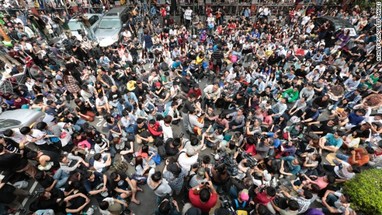
For years there have been daily protests near the legislature in Taipei. And there are frequent demonstrations, and scuffles, by legislators on the floor of the Legislative Yuan. But this confrontation is different. I cannot recall another time in recent history when protestors have actually invaded the legislature and prevented sessions from being called to order. For that reason alone, this student movement is an important development.
The Cross-Strait Trade Agreement is Not Just about Trade
It's also a big deal because it potentially broadens the challenges to the Ma administration’s vision of closer economic integration with the People’s Republic of China. The involvement of students, in particular, could move the framing of the services agreement bill from just another partisan fight to a deeper battle over Taiwan's economic future, and its democracy. And on those points, there are clear concerns.
This may be almost too obvious to mention, but the chief worry driving much of the energy against the bill is that it represents further commitment to economic integration with the People's Republic of China--the same China that is an unabashedly authoritarian state, a rising military power in East Asia, an economic behemoth, and a regime vowing to bring Taiwan under its political control, by force if necessary. It's also a state whose leaders are clearly uncomfortable with the way democracy works in Taiwan. The formula they have offered for unification, the "one country two systems" plan under which the PRC administers Hong Kong, doesn't look very appealing right now to most Taiwanese, especially given the lengths Beijing has gone to avoid popular elections of Hong Kong leaders.
The Ma administration may well be right in thinking Taiwan can reap economic gains without making political concessions to the PRC. But it hasn't made that case effectively to the large majority of Taiwanese who oppose closer political integration. Instead, the cross-Strait services trade agreement has become a focal point for that opposition: the cross-Strait agreements have never been solely about trade, but they risk becoming solely about politics. And even when the conversation is about trade, the Ma administration hasn't helped its case. All free-trade agreements create winners and losers, and Ma has focused on the forecast economic benefits without mentioning the losses. There is not much of a plan to compensate those whose livelihoods would be negatively affected under the agreement, or even to demonstrate that the administration is concerned about these people. With rising inequality, soaring housing prices, and an increasing youth unemployment rate, this does not appear to be a wise political strategy.
Political Realignment in the Cards?
Finally, the student protest is a big deal because it could represent the leading edge of a political realignment in Taiwan, from a national cleavage to an economic one. The same students who are occupying the legislature are among those whose economic futures do not look particularly bright right now. With its opposition to the cross-Strait agreement, the DPP is tapping into increasingly vulnerable segments of society that do not stand to gain from free trade agreements, whether with China or elsewhere.
It's not clear how much of this protectionist streak is due to the "China factor" in Taiwanese politics, and how much is due to a fundamental opposition to further opening Taiwanese markets. The evidence from the legislature is mixed: the vociferous opposition there to US beef and pork imports, for instance, ostensibly on health grounds, stands in contrast to the smooth passage of free trade agreements with New Zealand and Singapore in the past year, and to the DPP's official support for the Trans-Pacific Partnership. But the potential is there for the DPP to move toward a more populist stance on trade and other economic issues, and to win votes with it.
 RSS Feed
RSS Feed
